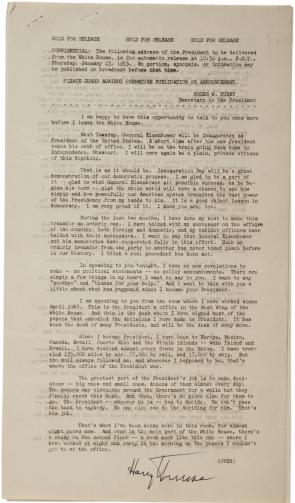President Truman’s Farewell Address, 1953
A Spotlight on a Primary Source by Harry S. Truman
 It has none of the catch phrases or warnings of other, more famous presidential inaugural or farewell addresses, no cautions against permanent alliances or military-industrial complexes, no appeals to better angels or declarations about fear. What President Harry Truman’s farewell address of 1953 does have is an abiding sense of optimism that the United States is on the right track and is well positioned to win the Cold War, beliefs that were proven correct nearly forty years after he left office. His support for these beliefs—that the “fatal flaw in [communist] society” is that “theirs is a godless system, a system of slavery” with “no freedom in it, no consent”—is a far cry from political scientists’ and historians’ arguments about internal contradictions, a precipitous drop in oil prices, and a loss of will on the part of Soviet leaders, but his assertions were unwavering. “Whether the Communist rulers shift their policies of their own free will,” he said, “or whether the change comes about in some other way—I have not a doubt in the world that a change will occur.”
It has none of the catch phrases or warnings of other, more famous presidential inaugural or farewell addresses, no cautions against permanent alliances or military-industrial complexes, no appeals to better angels or declarations about fear. What President Harry Truman’s farewell address of 1953 does have is an abiding sense of optimism that the United States is on the right track and is well positioned to win the Cold War, beliefs that were proven correct nearly forty years after he left office. His support for these beliefs—that the “fatal flaw in [communist] society” is that “theirs is a godless system, a system of slavery” with “no freedom in it, no consent”—is a far cry from political scientists’ and historians’ arguments about internal contradictions, a precipitous drop in oil prices, and a loss of will on the part of Soviet leaders, but his assertions were unwavering. “Whether the Communist rulers shift their policies of their own free will,” he said, “or whether the change comes about in some other way—I have not a doubt in the world that a change will occur.”
The excerpt below focuses on milestones from the early days of the Cold War. Truman acknowledged that “history will remember my term in office as the years when the ‘cold war’ began to overshadow our lives.” Calling it “a conflict between those who love freedom and those who would lead the world back into slavery and darkness,” with the atomic bomb “always in the background,” he recounts various crises, only briefly touching on Soviet nuclear technology and the atomic bombings of Hiroshima and Nagasaki. Truman devotes particular attention to the Korean War, referring to his decision to involve US troops as the most important of his presidency. He looks forward to the end of the Cold War, “when we can use the peaceful tools that science has forged for us to do away with poverty and human misery everywhere on earth.”
Excerpt
As the free world grows stronger, more united, more attractive to men on both sides of the Iron Curtain—and as the Soviet hopes for easy expansion are blocked—then there will have to come a time of change in the Soviet world. Nobody can say for sure when that is going to be, or exactly how it will come about, whether by revolution, or trouble in the satellite states, or by a change inside the Kremlin.
Whether the Communist rulers shift their policies of their own free will—or whether the change comes about in some other way—I have not a doubt in the world that a change will occur.
I have a deep and abiding faith in the destiny of free men. With patience and courage, we shall some day move on into a new era—a wonderful golden age—an age when we can use the peaceful tools that science has forged for us to do away with poverty and human misery everywhere on earth.
Think what can be done, once our capital, our skills, our science—most of all atomic energy—can be released from the tasks of defense and turned wholly to peaceful purposes all around the world.
There is no end to what can be done.
